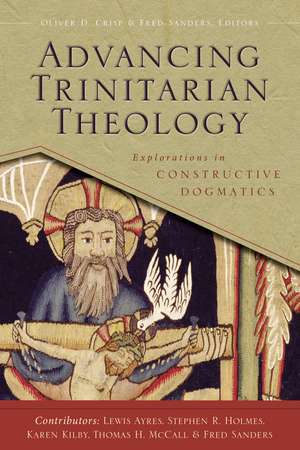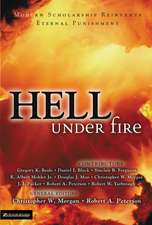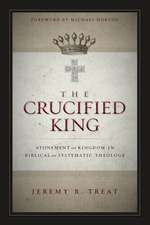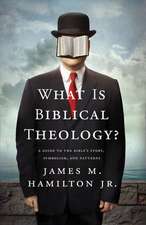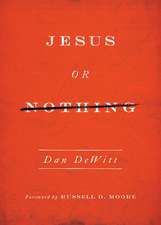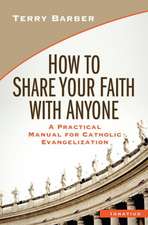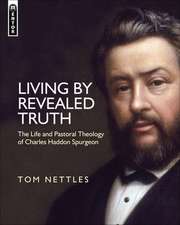Advancing Trinitarian Theology: Explorations in Constructive Dogmatics: Los Angeles Theology Conference Series
Editat de Oliver D. Crisp, Fred Sanders Autor Zondervanen Limba Engleză Paperback – 3 noi 2014
Throughout the last century, theologians gave great attention to the doctrine of the Trinity, and they largely succeeded in restoring it to a central place in Christian thought. But as they highlighted the novelty of the revolutionary new trinitarianism, a number of generalizations crept into the discussion that requires a careful reevaluation of the classical tradition.
Trinitarian Theology—the subject of the second annual Los Angeles Theology Conference—sought to make constructive progress in the doctrine of the Trinity by aligning the trinitarian revival with the ongoing task of retrieving the classical doctrine of the Trinity.
The nine diverse essays in this collection include discussions on:
- Ways to clarify the doctrine of the Trinity without sacrificing its essential mystery.
- The ways in which trinitarian theology applies practically to the Christian life and mission.
- Highlighting the counter-revolutionary trends in the most recent trinitarian thought.
- Discourse on the role Karl Barth played in advancing trinitarian thought.
Preț: 119.36 lei
Nou
Puncte Express: 179
Preț estimativ în valută:
22.85€ • 24.83$ • 19.20£
22.85€ • 24.83$ • 19.20£
Carte disponibilă
Livrare economică 31 martie-14 aprilie
Preluare comenzi: 021 569.72.76
Specificații
ISBN-13: 9780310517092
ISBN-10: 0310517095
Pagini: 208
Ilustrații: black & white illustrations
Dimensiuni: 152 x 229 x 15 mm
Greutate: 0.23 kg
Editura: Zondervan Academic
Colecția Zondervan Academic
Seria Los Angeles Theology Conference Series
Locul publicării:Grand Rapids, United States
ISBN-10: 0310517095
Pagini: 208
Ilustrații: black & white illustrations
Dimensiuni: 152 x 229 x 15 mm
Greutate: 0.23 kg
Editura: Zondervan Academic
Colecția Zondervan Academic
Seria Los Angeles Theology Conference Series
Locul publicării:Grand Rapids, United States
Descriere
An Exploration of Different Issues in the Doctrine of the Trinity.
Throughout the last century, theologians gave great attention to the doctrine of the Trinity, and they largely succeeded in restoring it to a central place in Christian thought. But as they highlighted the novelty of the revolutionary new trinitarianism, a number of generalizations crept into the discussion that requires a careful reevaluation of the classical tradition.
Trinitarian Theology—the subject of the second annual Los Angeles Theology Conference—sought to make constructive progress in the doctrine of the Trinity by aligning the trinitarian revival with the ongoing task of retrieving the classical doctrine of the Trinity.
The nine diverse essays in this collection include discussions on:
Throughout the last century, theologians gave great attention to the doctrine of the Trinity, and they largely succeeded in restoring it to a central place in Christian thought. But as they highlighted the novelty of the revolutionary new trinitarianism, a number of generalizations crept into the discussion that requires a careful reevaluation of the classical tradition.
Trinitarian Theology—the subject of the second annual Los Angeles Theology Conference—sought to make constructive progress in the doctrine of the Trinity by aligning the trinitarian revival with the ongoing task of retrieving the classical doctrine of the Trinity.
The nine diverse essays in this collection include discussions on:
- Ways to clarify the doctrine of the Trinity without sacrificing its essential mystery.
- The ways in which trinitarian theology applies practically to the Christian life and mission.
- Highlighting the counter-revolutionary trends in the most recent trinitarian thought.
- Discourse on the role Karl Barth played in advancing trinitarian thought.
Cuprins
AcknowledgementsIntroduction (the Editors)List of Contributors1. Lewis Ayres, Durham University2. Stephen Holmes, University of St. Andrews3. Karen Kilby, University of Nottingham4. Thomas McCall, Trinity Evangelical Divinity School5. Fred Sanders, Biola University
